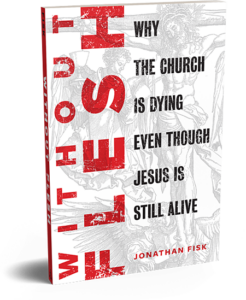 Book Review
Book Review
Book: Without Flesh (Why the Church is Dying Even Though Jesus is Still Alive)
Author: Jonathan Fisk
Paperback, 158 pages (including indexes)
Concordia Publishing House, 2020
Based on the sub-title of this book (Why the Church is Dying Even Though Jesus is Still Alive) one might expect this book to be about some new evangelism program. If that is your expectation, you will be disappointed. The book is not about a new program, evangelism or otherwise. The most overarching theme of the book is the incarnation of God in the person of Jesus. The overall diagnosis of the ills of the modern Church is that we have, in many, many ways, abandoned this faith. Because the incarnation is not a new idea, the topic of this book does not so much broaden our understanding of the Scriptures as much as it seeks to deepen our understanding of something Christians already believe.
Jonathan Fisk has a bracing style of writing that will challenge many readers. He insists that the Scriptures mean what they say, and for many a contemporary person that is unbelievable. After all, the Scriptures make many claims that do not conform to reason. For example, the Gospels tell us Jesus walked on water. If we make human reason, human wisdom, human whatever, the standard for deciding what is to be believed in the Bible then all of our Christian Faith would eventually come crumbling down. How can human reason fathom that Jesus is both 100% God and 100% human? How can human reason understand the virgin birth of Jesus? An honest elevation of human reason to the position of ultimate judge will deposit the Bible on the trash heap.
However, as I said, the overarching theme of this book is the incarnation (or the embodiment, or in-flesh-ment) of the Second Person of the Trinity. Just before he ascends, Jesus tells us that he is with us always (Matthew 28:20). In fact, it is the very last thing Jesus says and how Matthew chooses to close his Gospel. There is no Scriptural reason to think that Jesus meant he will be with us spiritually but not physically. Fisk unpacks this ancient truth. Indeed, there are many “body/flesh of Christ” passages which are turned into metaphors and parables for which the grammar of the actual text gives no reason to so twist the words. Fisk deals with many of them.
As one would expect in a book dealing with the continued incarnation of Jesus, a major element in the book is Fisk’s treatment of the Lord’s Supper. I’ve read and heard many objections to letting Jesus mean what he says, which always boil down to believing that what Jesus says is impossible, even for God. Fisk deals with all the familiar objections, and does it with great clarity.
I offer just one caveat. Fisk is passionate about the continuing reality of the incarnation. That, at times, leads him to overstate his case. One example can be found on page 42 where he claims the most frequently quoted words from the Bible are the words Jesus used to institute the Lord’s Supper. As the words are repeated in every worship service that celebrates this Sacrament, they certainly are some of the most repeated and known words of the Bible. However, in those same services Christians will pray the Lord’s Prayer as well as use the words “in the name of the Father and of the Son and of the Holy Spirit” (the Invocation) lifted from Jesus’ Great Commission instruction about Baptism. Furthermore, Christians use the Lord’s Prayer and the Invocation throughout the week. So Fisk would have been better served to say, “Some of the most often used words …” instead of suggesting they are the most used words.
But such overstatements I find easy to excuse and I endorse his theology fully. My only fear concerning the overstatements is that some might use them as an excuse to discount the soundness of his book.
Fisk, then, would have the Church return to taking Scriptures seriously, including its references to the incarnation, and especially in reference to our Lord’s words when he instituted his New Testament, that is, Communion.
This book has my full endorsement and you can expect to see numerous quotes from it in coming weeks appearing on our facebook page. The only problem with facebook quotes is that facebook doesn’t allow me to use bold face and italics text (or I don’t know how to use them), and Fisk is very fond of both.
Pastor John Rickert
Our Redeemer Lutheran Church
Newark, Delaware
